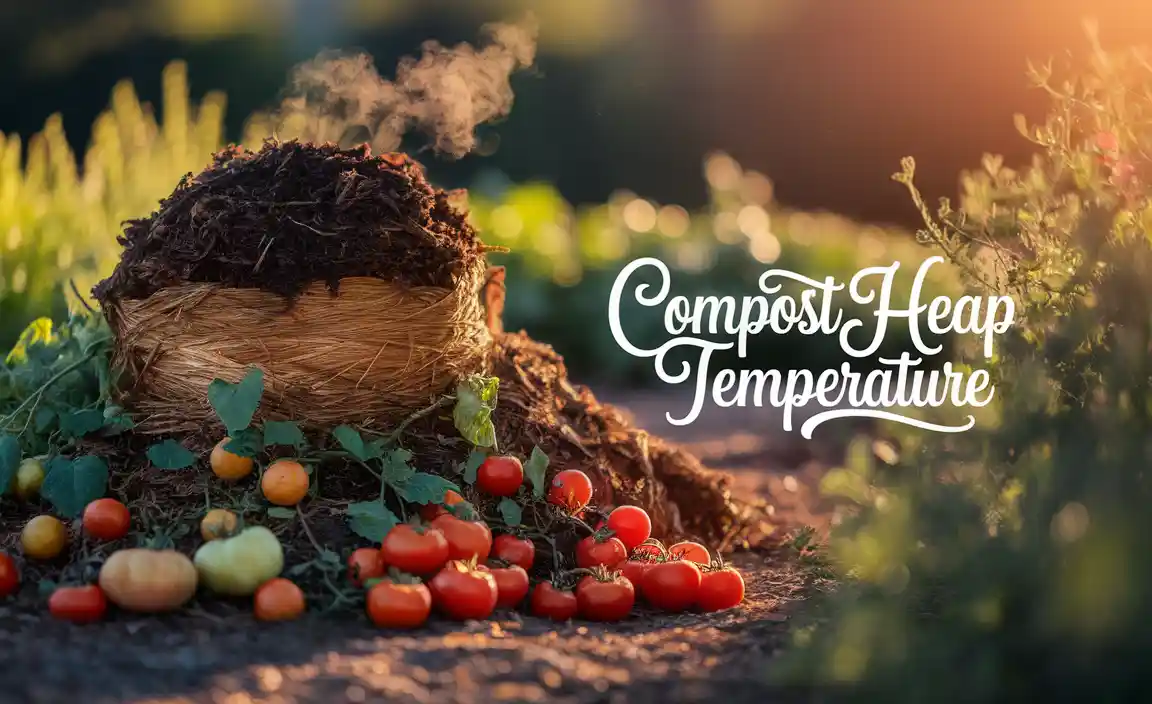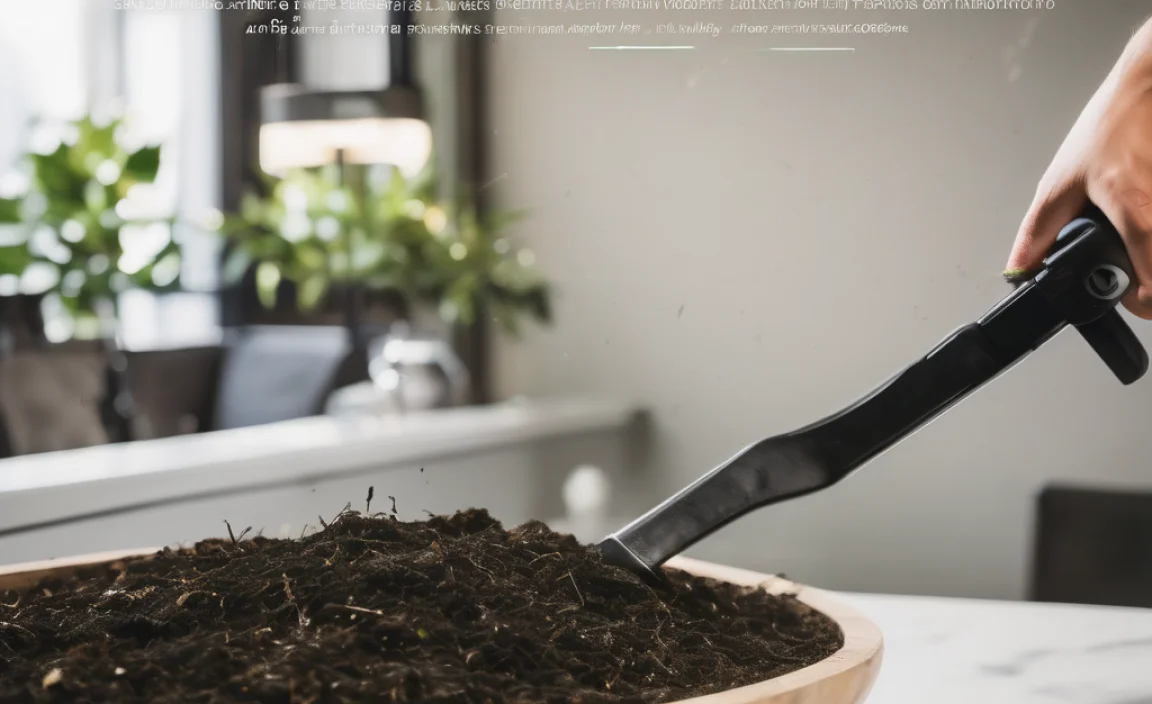Have you ever wondered how a compost heap works? Picture it like a magic trick! You throw in old fruit, veggies, and leaves, and they turn into rich soil. But to make this happen, you need to check the compost heap temperature. It’s like an oven. Too hot or too cold, and the magic stops! Why is this important? Let’s find out together!

Key Takeaways
- Compost heap temperature is crucial for effective decomposition.
- Ideal temperature ranges between 135°F and 160°F.
- Too low temperature slows down the composting process.
- Turning the pile helps maintain the right temperature.
- Temperature monitoring ensures a healthy compost heap.
Understanding Compost Heap Temperature
The compost heap temperature plays a big role in the composting process. Imagine baking a cake. You need the right heat, or it won’t bake properly. In a compost heap, temperature works the same way. Different temperatures help different microbes break down the waste. If it’s too cold, the composting slows down. But if it’s too hot, beneficial microbes might die.
- Compost piles generate their own heat.
- Microbes are tiny organisms that break down matter.
- The right temperature speeds up decomposition.
- Too hot temperatures can kill helpful microbes.
- Temperature affects moisture levels in the pile.
- A balanced pile can self-regulate its heat.
- Check temperature regularly with a compost thermometer.
To check the temperature, use a compost thermometer. Insert it into the middle of the pile. The ideal range is between 135°F and 160°F. This range is perfect for killing harmful pathogens and weed seeds. Maintaining this temperature also ensures a faster composting process. Turn the pile often to distribute heat evenly.
Fun Fact or Stats : Compost piles can heat up to over 160°F naturally!
Why Temperature Matters
Why does the temperature matter in a compost heap? Think of it like cooking. Without the right heat, your meal won’t cook well. In composting, heat helps break down materials quickly and safely. Bacteria and fungi love warmth. They work faster when it’s hot. A good temperature also keeps pests away. So, next time you check your compost heap, think of it as a tiny kitchen!
Ideal Temperature Range for Compost
What’s the best temperature for a compost heap? It should be between 135°F and 160°F. This range allows good bacteria to thrive. At this heat, harmful bugs and weed seeds die. Imagine it as a spa for microbes. They work their magic in these temperatures. Keep your compost between these limits for best results.
How to Measure Compost Temperature
Have you ever checked the temperature of a compost heap? It’s easy! You just need a compost thermometer. Stick it into the pile’s center. Wait for a few minutes. Check the reading. Is it in the ideal range? If it’s too low, turn the pile. This helps raise the temperature. Check again in a few days to see improvements.
Factors Affecting Compost Temperature
What influences the compost heap temperature? Several factors come into play. Think of it like a puzzle. Each piece affects the overall picture. The right mix of green and brown materials is important. Green materials like food scraps provide nitrogen. Brown materials like leaves provide carbon. Water also plays a key role. Too much water can cool the pile.
- Green materials add nitrogen.
- Brown materials add carbon.
- Water keeps the pile moist.
- Airflow helps maintain the right temperature.
- Turning the pile adds oxygen.
- Sunlight can increase the heap’s heat.
- Location affects temperature stability.
All these factors work together to create the perfect environment. Check the balance regularly. Make adjustments as needed. Too much or too little of any element can affect the temperature. Keep your pile happy and productive by monitoring these factors.
Fun Fact or Stats : The perfect composting recipe includes equal parts greens and browns!
The Role of Moisture
How does moisture affect compost heap temperature? Imagine trying to light a fire with wet wood. It doesn’t work well, right? In composting, too much water cools the pile. But too little can dry it out. A damp sponge consistency is what you want. This balance helps maintain a good temperature. So, check the moisture level often!
Importance of Airflow
Why is airflow important in a compost heap? Think of a campfire. Without air, the fire dies. Compost piles need air to breathe and stay warm. Turning the pile adds oxygen and helps heat distribution. This boosts the composting process. So, make sure your compost pile gets enough air!
Impact of Sunlight
Does sunlight affect compost heap temperature? Yes, it does! Sunlight can warm your compost pile naturally. But too much sun can dry it out. Choose a spot with partial shade. This protects the pile from overheating during hot days. Sunlight helps maintain a steady temperature, which is good for decomposition.
Monitoring Compost Heap Temperature
Why should you monitor compost heap temperature? It’s like checking your oven when baking. It helps you know when the pile is too hot or too cold. Regular checks ensure everything is working fine. Use a thermometer to measure the heat inside. If the temperature is off, take action. Adjust the pile to keep it healthy and productive.
- Check temperature weekly with a thermometer.
- Record temperature to track changes over time.
- Adjust pile materials as needed.
- Turn pile if temperature is too low.
- Wet pile if it’s too dry to increase heat.
- Cover pile in cold weather to retain heat.
- Uncover in hot weather to cool down.
Keeping an eye on temperature helps prevent problems. A well-managed pile breaks down faster and stays healthy. It’s a fun and rewarding process. Plus, you get great soil for your garden!
Fun Fact or Stats : Compost piles can lose heat quickly if not turned often!
Tools for Monitoring
What tools do you need to monitor compost heap temperature? A compost thermometer is key. It’s like a giant needle. Stick it into the middle of your pile. Make sure it reads correctly. Journals or apps can help record temperatures. Write down each reading to track changes. Watch how your pile reacts to different weather.
Keeping Records
Why keep records of your compost heap temperature? It helps you see patterns. Over time, you’ll notice what affects your pile most. Maybe rain cools it down. Or maybe turning heats it up. This info helps you make better decisions. It’s like a compost diary. Each entry tells the story of your pile’s journey.
Responding to Temperature Changes
How do you respond to changes in compost heap temperature? Think of it like adjusting a recipe. If it’s too cold, add more greens. If it’s too hot, turn the pile. Check moisture levels too. Keeping a balance keeps your compost healthy. Quick responses to temperature changes ensure a good end product.
Benefits of Temperature Control
What benefits come from controlling compost heap temperature? A well-managed pile breaks down faster. It also prevents bad smells. Good temperature control kills harmful bugs. Your garden will love the rich soil you make. Plus, it’s a great way to recycle kitchen and garden waste. Temperature control is key to successful composting.
- Faster composting process saves time.
- Prevents bad odors from developing.
- Kills harmful pathogens and weed seeds.
- Produces nutrient-rich compost for gardening.
- Reduces kitchen and garden waste.
- Encourages eco-friendly practices.
- Improves soil structure and fertility.
With patience and care, you’ll have the best compost in town. It’s a rewarding journey. Plus, it helps the environment. Next time you compost, think of the benefits you’re creating. You’ll be proud of the healthy soil you produce.
Fun Fact or Stats : Controlled compost can be ready in just a few months!
Eco-Friendly Impact
How does composting benefit the environment? It’s like turning trash into treasure! Composting reduces landfill waste. It cuts down on greenhouse gases. Less garbage means less pollution. The compost you make enriches the soil. This helps plants grow better. Every little bit helps the planet. Your compost heap makes a difference!
Composting for Garden Health
Why is compost important for gardens? Think of it as superfood for plants. Compost provides nutrients that help plants grow strong. It improves soil structure. This allows roots to spread easily. With better soil, your plants will thrive. Compost also helps retain moisture. Your garden will bloom like never before!
Reducing Waste
How does composting reduce waste? It’s simple! Instead of throwing away food scraps, compost them. This reduces the amount of trash. Fewer items go to landfills. Less garbage means less space needed for dumps. Composting is an easy way to help the Earth. It turns waste into something useful. Everyone can contribute!
Conclusion
To sum up, compost heap temperature is crucial for successful composting. It’s like keeping a secret recipe. Monitor it regularly for best results. Maintain the right temperature, and you’ll get rich compost. This benefits your garden and the planet. Enjoy creating your own soil magic!
FAQs
Question: Why is compost heap temperature important?
Answer: Compost heap temperature is crucial because it speeds up decomposition. It allows good bacteria to thrive and kills harmful pathogens. Maintaining the right temperature ensures a healthy, fast-breaking compost pile. It’s like cooking at the right heat for the best results.
Question: What is the ideal compost heap temperature range?
Answer: The ideal compost heap temperature range is between 135°F and 160°F. This range helps maximize microbial activity and speed up decomposition. It also kills harmful pathogens and weed seeds. Keeping your compost in this range ensures a healthy and efficient breakdown process.
Question: How can I measure the temperature of my compost heap?
Answer: You can measure your compost heap temperature using a compost thermometer. Insert the thermometer into the center of the pile. Wait a few minutes for an accurate reading. Check the temperature regularly to ensure it stays in the ideal range for composting.
Question: What happens if the compost heap temperature is too low?
Answer: If the compost heap temperature is too low, decomposition slows down. Microbes become less active, causing a longer composting process. To fix this, turn the pile and add more green materials. This can help raise the temperature and speed up decomposition.
Question: Can high temperatures harm my compost heap?
Answer: Yes, high temperatures can harm your compost heap. If it gets too hot, beneficial microbes might die. This slows down the composting process. Turning the pile can help distribute heat and cool the pile down. Keep an eye on the temperature to avoid overheating.
Question: How often should I check my compost heap temperature?
Answer: You should check your compost heap temperature at least once a week. Regular checks help you see how well the composting process is going. It also allows you to make timely adjustments. Monitoring helps ensure efficient decomposition and a healthy compost pile.


